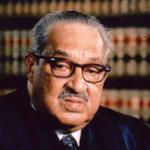Marshall's Unfair Attack on the Founders
 Monday, the RNC criticized Elena Kagan for approvingly citing Thurgood Marshall's negative comments on the constitution. Lost in the media furor and condemnation of the RNC though is the fact that Marshall’s critique was also unfair.
Monday, the RNC criticized Elena Kagan for approvingly citing Thurgood Marshall's negative comments on the constitution. Lost in the media furor and condemnation of the RNC though is the fact that Marshall’s critique was also unfair.
Democrats are attempting to make hay of the RNC's criticism of Elena Kagan's approving citation of her former boss, Justice Thurgood Marshall. The purportedly offensive press release asked whether Kagan still believed that the Constitution "As Originally Drafted and Conceived" was "Defective." Even the conservative Abigail Thernstrom took Michael Steele to task for this criticism, suggesting that Marshall was, of course, right about the defective character of the original Constitution.
Recognizing that in a nomination fight, the truth is too often a secondary consideration, it remains important both for Marshall's legacy and for our own fidelity to the Constitution, that we understand what exactly Marshall's charge was.
He did not, as has been suggested by critics of the GOP attack, simply suggest that the 3/5 Compromise was a blight on the Constitution. Even on its own, his focus on the 3/5 Compromise does not do the work Marshall wants it to. The Compromise, rather than demonstrate the fundamental injustice of the Founding by counting blacks as less than fully human, was in fact a positive addition to the Constitution insofar as it diluted the political power of slave states that would have been happy to have slaves count as full persons for the purpose of apportioning representatives.
Still, Marshall argued something even more misguided.
He stated:
I do not believe that the meaning of the Constitution was forever 'fixed' at the Philadelphia Convention. Nor do I find the wisdom, foresight and sense of justice exhibited by the Founders particularly profound.
This assessment by Marshall was a low point in a remarkable career. Rather than learn from Abraham Lincoln and Frederick Douglass, who understood the fundamental justice of the American Founding, Marshall took his cue instead from Justice Taney. While the Founders' compromise with slavery was the Constitution's original sin, they did not, as claimed by Taney and other later pro-slavery partisans, argue that slavery was a positive good or that blacks were by definition excluded from the promises of the Declaration and Constitution. The Founding generation was committed to the revolutionary principle that all persons are created equal and that slavery is an assault on those persons' natural rights. Rather than Marshall's condescension, the Founders deserve our praise for setting in motion a natural rights republic that would liberate the slaves, promote economic liberty, and ultimately save the world from the twin tyrannies of Nazism and Communism.
In her article praising her mentor, Kagan wrote that Marshall "allowed his personal experiences, and the knowledge of suffering and deprivation gained from those experiences, to guide him." Kagan is certainly correct that Marshall's experience with the deep evil of Jim Crow, and with the de facto segregation of the North, made him first an effective advocate and later a statesman.
But it is fair to note that in this case those same experiences clouded Marshall's judgment and led him to unfairly assess the accomplishments of the Founders and the enduring justice of the original Constitution.